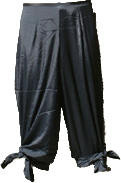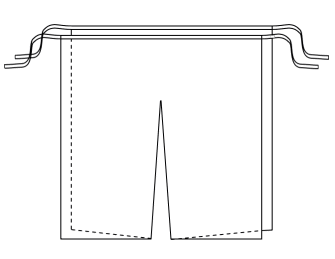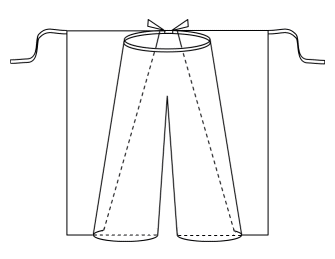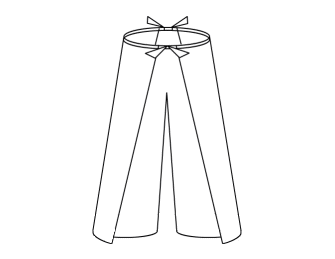Difference between revisions of "Wrap pants"
m (→Links: removed link appeared to be no longer valid ~~~~) |
|||
| (5 intermediate revisions by 2 users not shown) | |||
| Line 4: | Line 4: | ||
[[Image:Wrappants 3.gif |thumb|Step three; Tie the leg ties on the outside of each leg, or tie the corners if you elected to use the style that did | [[Image:Wrappants 3.gif |thumb|Step three; Tie the leg ties on the outside of each leg, or tie the corners if you elected to use the style that did | ||
not incorporate ties. ]] | not incorporate ties. ]] | ||
| + | '''Wrap pants''' are a popular style of modern [[bottoms]] that are popular among Amtgardians and other [[LARP]]ers for their ease wear and simple construction. While they have no direct historical basis, there are many examples of "wraps" through history that were worn by all genders. | ||
| − | ===History | + | ===History=== |
| − | + | The idea of wrapping cloth around oneself is not unique to the modern LARP community. Clothing items intended to be wrapped around the body, like the [[sarong]] or the [[sari]], have been popular in Eastern and Southern Asia since far before European colonization. The Romans wore a ''pallium'', a wrapped cloak, which fazed out the ''toga'' in the 2nd century B.C.. But the idea of pant-like wraps is a modern invention, embraced by communities like LARPers and western yogis. | |
| − | |||
| − | ''' | ||
| − | |||
| − | |||
| − | |||
| − | |||
| − | |||
| − | |||
| − | |||
| − | + | Wrap pants can be close on the top with ties, buttons, velcro, snaps, or other fastening options. The leg openings can also be tied with ties, with the corners of the pants, or hung free and loose. | |
| − | + | ||
| − | + | There are many benefits to wearing wrap pants over traditional bottoms options. Wrap pants are worn rather loose, and can feel cooler during hot engagements. They can also easily be put on over [[mundane]] clothing, for a quick transition into garb. They are also very easy to make, with practiced wrap pants-garbers able to crack out a pair in just a few minutes. | |
| − | + | ||
| − | + | On the other hand, wrap pants have no historical basis, nor are they featured in any popular fantasy universe, leaving those who wish to have garb accurate to a source without wrap pants as an option. They are also, while easy to sew, just as simple as making a normal pair of pants. They can also be a hassle to manage for Amtgardians who attend event where the site makes heavy use of [[Port-a-Johns]], as taking them off and on can be a hassle in tight spaces. | |
| − | + | ||
| − | + | ===Making wrap pants=== | |
| + | Wrap pants take about 1.5-2.5 yards of material to make, depending on the waist size and height of their recipient. The material is dependent on their intended use, with thicker and more durable fabrics being required for wrap pants intended for the battlefield. Natural materials are often preferred, like heavyweight [[linen]] and [[bottomweight]] [[cotton]]. For pants that won't need to endure the friction of fighting, lighter materials can be used, such as lightweight cotton and [[silk]]. Wrap pants are sometimes heavily patterned, and very colorful. | ||
| + | |||
| + | The basic wrap pants pattern simply features two identical rectangles, measured to the wearer's specifications, laid right-side together. A U-shaped crotch is sewn and cut out, resulting in a quick and easy pair of pants. To keep them on, ties are often sewn onto the waist, and sometimes onto the legs as well. Less commonly, the legs are sew together in a V-shaped gap, and the pants are finished as usual. | ||
====Links==== | ====Links==== | ||
| − | *[http://www.amtgard-wl.com/library/howtos/how2wrap.pdf | + | *[http://www.amtgard-wl.com/library/howtos/how2wrap.pdf Instructional PDF] by [[Vaargard]] |
| − | + | *[http://www.amtgard-eh.com/library/howtowrappants.html Diagrams and tutorial] by [[Sir]] [[Squeak!]] | |
| − | *[http://www.amtgard-eh.com/library/howtowrappants.html | ||
[[Category:Amtgard Things]] [[Category:Amtgard Terms]] | [[Category:Amtgard Things]] [[Category:Amtgard Terms]] | ||
| + | [[Category:How To]][[Category:Garb]] | ||
| + | [[Category:Garb Bottoms]] | ||
Latest revision as of 12:15, 12 February 2021
Wrap pants are a popular style of modern bottoms that are popular among Amtgardians and other LARPers for their ease wear and simple construction. While they have no direct historical basis, there are many examples of "wraps" through history that were worn by all genders.
History
The idea of wrapping cloth around oneself is not unique to the modern LARP community. Clothing items intended to be wrapped around the body, like the sarong or the sari, have been popular in Eastern and Southern Asia since far before European colonization. The Romans wore a pallium, a wrapped cloak, which fazed out the toga in the 2nd century B.C.. But the idea of pant-like wraps is a modern invention, embraced by communities like LARPers and western yogis.
Wrap pants can be close on the top with ties, buttons, velcro, snaps, or other fastening options. The leg openings can also be tied with ties, with the corners of the pants, or hung free and loose.
There are many benefits to wearing wrap pants over traditional bottoms options. Wrap pants are worn rather loose, and can feel cooler during hot engagements. They can also easily be put on over mundane clothing, for a quick transition into garb. They are also very easy to make, with practiced wrap pants-garbers able to crack out a pair in just a few minutes.
On the other hand, wrap pants have no historical basis, nor are they featured in any popular fantasy universe, leaving those who wish to have garb accurate to a source without wrap pants as an option. They are also, while easy to sew, just as simple as making a normal pair of pants. They can also be a hassle to manage for Amtgardians who attend event where the site makes heavy use of Port-a-Johns, as taking them off and on can be a hassle in tight spaces.
Making wrap pants
Wrap pants take about 1.5-2.5 yards of material to make, depending on the waist size and height of their recipient. The material is dependent on their intended use, with thicker and more durable fabrics being required for wrap pants intended for the battlefield. Natural materials are often preferred, like heavyweight linen and bottomweight cotton. For pants that won't need to endure the friction of fighting, lighter materials can be used, such as lightweight cotton and silk. Wrap pants are sometimes heavily patterned, and very colorful.
The basic wrap pants pattern simply features two identical rectangles, measured to the wearer's specifications, laid right-side together. A U-shaped crotch is sewn and cut out, resulting in a quick and easy pair of pants. To keep them on, ties are often sewn onto the waist, and sometimes onto the legs as well. Less commonly, the legs are sew together in a V-shaped gap, and the pants are finished as usual.



